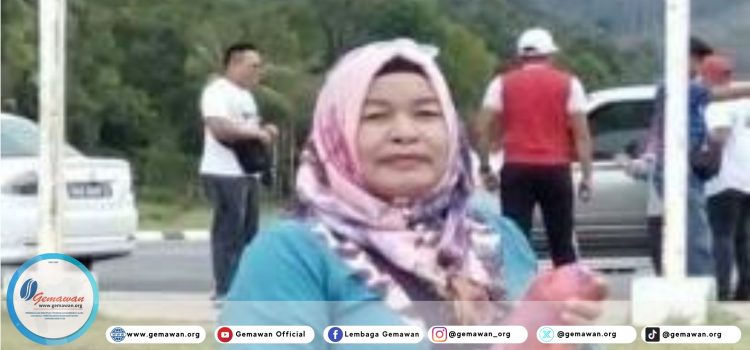
Masitah, a resilient woman from Keranji Hamlet, Tanjung Mekar Village, Sambas Regency, has dedicated her life to women’s empowerment and the preservation of local culture.
She married Hasbian on May 20, 1990, and since then has balanced her roles as a wife, a home-based tailor, and a community organizer. Although she only completed vocational school, the sewing skills she learned during her studies became a valuable foundation that helped sustain her family’s economy.
In addition to tailoring, Masitah also serves as a PAUD (early childhood education) teacher in her village. She is well known for her active involvement in social activities and women’s organizations. Between 2020–2023, she served as the Chairperson of SERUMPUN Sambas (North Coast Women’s Union), and currently holds the position of Deputy Secretary General of SERUMPUN for the 2023–2027 period.
From Sewing to Weaving: A Path Toward Independence
Realizing that tailoring work was seasonal, in 1991, Masitah began learning to weave traditional textiles, earning small payments from a Chinese trader in Sambas Market while continuing her sewing business at home.
“As human beings, we all have the desire to grow — to learn, to progress, and to expand our horizons,” she said.
A year later, in 1992, she and her husband moved into their own home in Keranji Hamlet, where she actively engaged with the local community. She joined various initiatives such as PKK (Family Welfare Movement), BKMT (Women’s Religious Council), and Posyandu (community health post), and now serves as a member of the Village Consultative Body (BPD) of Tanjung Mekar.
With the income she earned from sewing and weaving, and with support from her husband and parents, in 1993 Masitah bought her first weaving loom. From that moment, she began producing and selling her woven textiles independently—marking the beginning of a journey toward self-reliance and community empowerment.
A Woman Who Mobilizes Others
In 2006, Masitah connected with the Gemawan Association, a local NGO, through the ASPPUK (Association of Women Microenterprise Facilitators) network. Together with other women, she formed a group called ASOKA in Tanjung Mekar Village, starting with 25 members, and she was trusted to lead it.
Under her leadership, the initiative expanded to neighboring villages such as Sejangkung, Tebas, Subah, and Paloh. These women’s groups regularly held monthly meetings, discussing issues, sharing experiences, and participating in training sessions covering women’s leadership, gender awareness, entrepreneurship, natural dyeing techniques for woven fabrics, product packaging, and marketing strategies.
Such capacity-building programs helped strengthen both the economic resilience and solidarity of women across these communities.
Seeing the growing demand for woven products, Masitah decided to expand her production. From one loom, she now owns four looms for cloth and one for scarves, employing five other women to assist in weaving and production while she continues offering sewing services.
“Alhamdulillah, I can now help other women earn income,” she said with gratitude.
“Thanks to Gemawan for guiding us — for giving us courage to move forward, to rise above our challenges, and to create change.”
Stitching Empowerment into Every Thread
Masitah’s story is proof that women are not merely participants but drivers of change — both in their households and within their communities.
Her commitment to sewing, weaving, and organizing women’s collectives has woven a broader narrative of empowerment from the village level upward.
Through patience, persistence, and purpose, Masitah has shown that a needle and thread can do more than mend fabric — they can stitch together the spirit of independence and solidarity among women who dare to dream beyond their limitations.
Writer: Siti Rahmawati, Gemawan Activist
